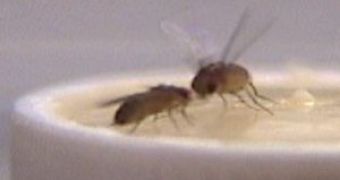Researches made on fruit fly have showed that sexual behavior is highly determined by a gene, known as "fruitless". The find is a landmark in defining the neuronal origin of sexual and aggressive behavior. "Aggression is a very serious problem in society, and it's a problem with a biological and genetic component," said Edward Kravitz, professor of neurobiology at Harvard Medical School.
The large fruitless gene encodes some proteins necessary for male courting behavior and found on about 2 % of the fruit fly's neurons. Males lacking the proteins are not interested in females, and they sometimes can court males. Females with the fruitless gene court other females in a male fashion.
The new study has proven that the same gene stays behind another sex-specific behavior, aggressive behavior. Female fight between them for food resources and they usually use head butts. Males fight especially to get females and use lunges, snapping into their adversaries with their forelegs down. When lacking the masculinity gene, males mostly use the head butts when fighting. With the masculine gene, females chase away adversaries lunging towards them.
For five years, Kravitz's team has studied the link between molecular changes and behavioral shifts. The flies were videorecorded, and analysis on slow motion revealed each move and countermove. "Drosophila have marvelous advantages in terms of genetic tricks and flies in many respects behave and respond similarly to humans." said Laurie Tompkins, program director at the National Institute of General Medical Sciences.
"The findings provide a welcome guidepost to help enable future research to track down the underlying neural circuitry", said Bruce Baker, a biology professor at Stanford who discovered the link between the fruitless gene and male courtship behavior. "We can think about understanding in molecular detail how we go from the initial genes and the proteins they encode to the nervous system that causes our body to respond in certain ways."
"More generally, such studies form a potential bridge between systems neuroscience studies of behavior and modern molecular neuroscience research into individual neurons and synapses."

 14 DAY TRIAL //
14 DAY TRIAL //